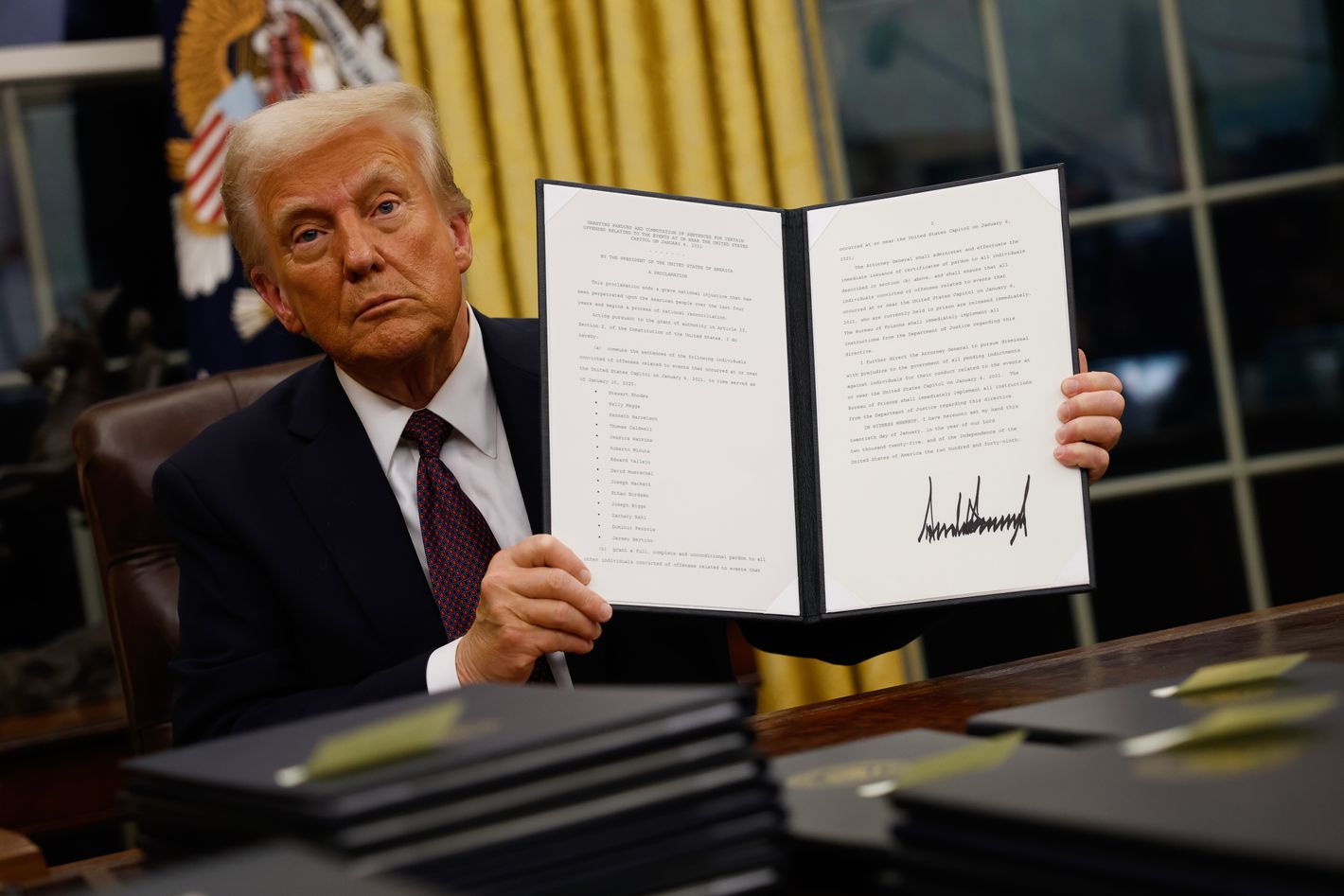Photo: Anna Moneymaker/Getty Images
In trying to sort through and make sense of all the momentous events marking the transition from the 46th presidency to the 47th, it’s tempting to turn the actions of Joe Biden and Donald Trump into matched sets. In some cases, that’s justifiable; Biden reversed quite a few Trump policies by executive order when he took office in 2017, and in some cases Trump is reversing the reversals right now (e.g., on withdrawal from the World Health Organization and the Paris climate accords). But sometimes the comparisons are of apples and oranges at best. Some commentators lumped together Biden’s and Trump’s transition-week pardons as two sides of the same dubious coin of sovereign clemency powers. Here’s Politico Playbook’s take, from its new British editor Jack Blanchard:
The biggest story of the night … was Trump’s extraordinary tidal wave of clemency, with the new president issuing pardons or commutations for nearly every person convicted of crimes — including serious violence — in the January 6 Capitol insurrection. This was big — about as big as Trump could possibly go. Only hours earlier Biden, of course, had issued his own shocking flurry of preemptive pardons for friends, family, and associates during his final morning — his final moments — in power. It probably shouldn’t take a Brit to tell you that none of this is remotely normal. At all.
So Biden’s “shocking flurry” of pardons was matched by Trump’s “extraordinary tidal wave.” Thrust, then counter-thrust, an action with a reaction, right? No, actually, that’s wrong.
Biden’s last-minute pardons were legally controversial in that they were preemptive, offering protection to potential Trump-administration targets who have not been indicted, much less convicted, of criminal wrongdoing, as CNN reports:
Clemency for General Mark Milley, Dr. Anthony Fauci, and members of Congress who served on the committee investigating the January 6, 2021, attack on the Capitol, was announced early Monday morning. Later, minutes before Trump was to be inaugurated as the nation’s 47th president, Biden also issued pardons for members of his family: his brothers James and Frank, his sister Valerie, and their respective spouses.
The pardons, coming in the final hours of Biden’s presidency, amount to a stunning flex of presidential power that is unprecedented in recent presidential history. They serve to protect several outspoken critics of the incoming president, including former Republican representative Liz Cheney, whom Trump has vowed retribution against.
Trump, by contrast, moved to protect over 1,500 people who most definitely have been indicted, tried, and convicted of criminal wrongdoing in connection with the assault on the U.S. Capitol on January 6, 2021, as the Associated Press reported:
President Donald Trump has pardoned, commuted the prison sentences, or vowed to dismiss the cases of all of the 1,500-plus people charged with crimes in the January 6, 2021, U.S. Capitol riot, including people convicted of assaulting police officers, using his clemency powers on his first day back in office to undo the massive prosecution of the unprecedented assault on the seat of American democracy.
Trump’s action, just hours after his return to the White House on Monday, paves the way for the release from prison of people found guilty of violent attacks on police, as well as leaders of far-right extremist groups convicted of failed plots to keep the Republican in power after he lost the 2020 presidential election to Democrat Joe Biden.
There was a preemptive aspect to Trump’s exercise in clemency, too: “Trump also ordered the attorney general to seek the dismissal of roughly 450 cases that are pending before judges stemming from the largest investigation in Justice Department history.”
In general, though, Biden pardoned people who as far as we know haven’t committed crimes (in this last-minute wave, that is; an earlier pardon for convicted felon Hunter Biden is a different matter). Biden’s list was comprised of people Trump targeted by name for investigation and prosecution during his 2024 campaign. Meanwhile, Trump opened the prison doors and expunged the record for insurrectionists who (whatever you think of them and their actions) did enjoy due process in facing accountability for the events of January 6 (unlike Trump himself, who was protected from prosecution by the U.S. Supreme Court).
The 47th president may understandably rage that the 46th has kept him from embarking on the full vengeance tour he seemed to contemplate in calling for a special prosecutor to “go after” Biden and his family, and in describing members of the January 6 investigative committee as traitors. But the idea that Biden’s pardons were as audacious as Trump’s is itself pretty audacious.

